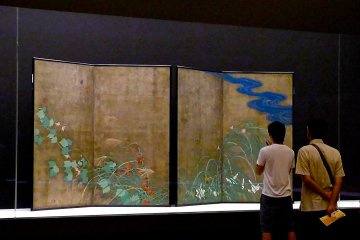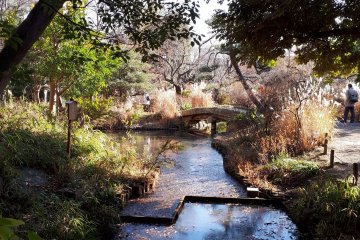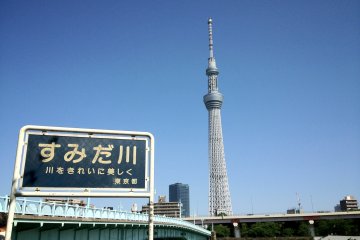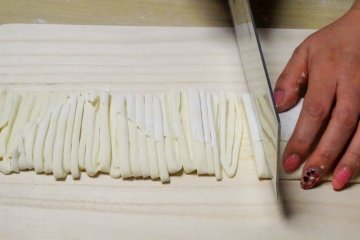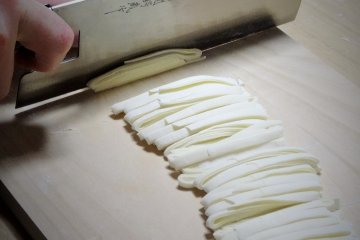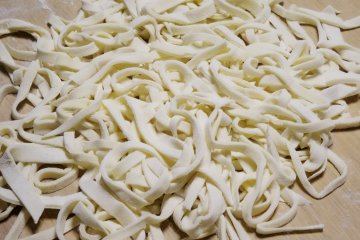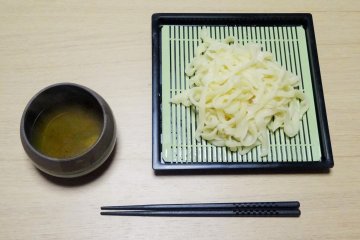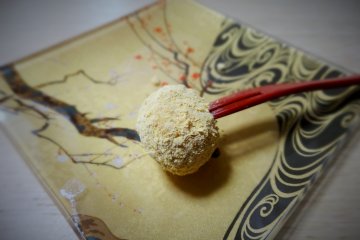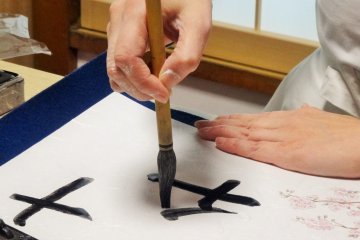The glitz and glamor of central Tokyo feel very far away from the backstreets of the Mukojima neighborhood, a stone’s throw from the gleaming Skytree, but that’s just how Masako Uchiyama likes it.
“This is the real Tokyo,” says the founder of Shitamachi Yoitoko, a newly-created cooking and culture company located in one of the city’s traditional downtown neighborhoods (shitamachi). The location is as big a selling point as the experience, she explains, since this is where visitors can interact with regular Japanese and get a peek at daily life in the capital.
Cooking classes are the bread and butter (or rice and seaweed) of Shitamachi Yoitoko and visitors can choose from among four menus. The tempura and soba menu and okonomiyaki options are crowd pleasers, while the handmade udon – served in combination with steamed egg custard and easy-to-make traditional sweets – is one of the more unique dishes on offer. The noodles themselves may be unremarkable, but the traditional method of preparation involves stomping on the dough multiple times (in a sanitary manner, of course) and carefully slicing it into strips. Uchiyama also offers a sweets-only menu, where participants whip up various rice-flour treats such as shiratama dango (white rice flour dumplings) or sweet mochi. Most classes end with a tasting hour, where participants get to enjoy the fruits of their labor. Those who participant in the udon class even get to take home the extra dough or noodles, as well as a pair of chopsticks.
Uchiyama’s initial goal is to introduce dishes that are easy to make, have simple ingredients and can be replicated in traveler’s home kitchens. She also plans to add grocery store tours to the agenda in the future, helping guests to better navigate the various sections of Japanese supermarkets and find and cook ingredients they may not traditionally use.
In addition to the cooking experience, Shitamachi Yoitoko can arrange hands-on cultural experiences for interested visitors. Uchiyama herself teaches ikebana, calligraphy, origami and gamaguchi (coin purse making). In the calligraphy experience, Uchiyama will even come up with Japanese kanji for foreign names, creating a personalized Japanese signature for her guests. Additional practitioners instruct visitors in classical Japanese dance.
Cooking classes cost ¥4500 (plus tax) and must be booked at least one day in advance. The cultural experiences are ¥4000 (plus tax), and can be booked back-to-back with a cooking experience. Customers who book two classes will receive a small gift.
As traditional shitamachi can be a maze of tiny streets, Uchiyama or a staff member will meet all visitors at the Hikifune train station (Tobu line). Simply look for the staffer just outside the tickets gates wearing a shirt sporting the Shitamachi Yoitoko logo.
The Mukojima area is just one stop from the Tokyo Skytree, making it easy to combine a cooking or cultural experience with a visit to the famous landmark. The popular neighborhood of Asakusa is also nearby, with Senso-ji, Tokyo’s oldest temple and a host of hidden shops and restaurants. In spring, Uchiyama encourages visitors to explore the area between Asakusa and Mukojima, which is abloom with hundreds of cherry blossoms.
Mukojima may lie slightly off the beaten path, but Masako feels that’s part of the appeal. “Here you will feel the shitamachi culture,” she explains, and enjoy a way of life that hasn’t been lost to the frenetic pace of the modern city.



